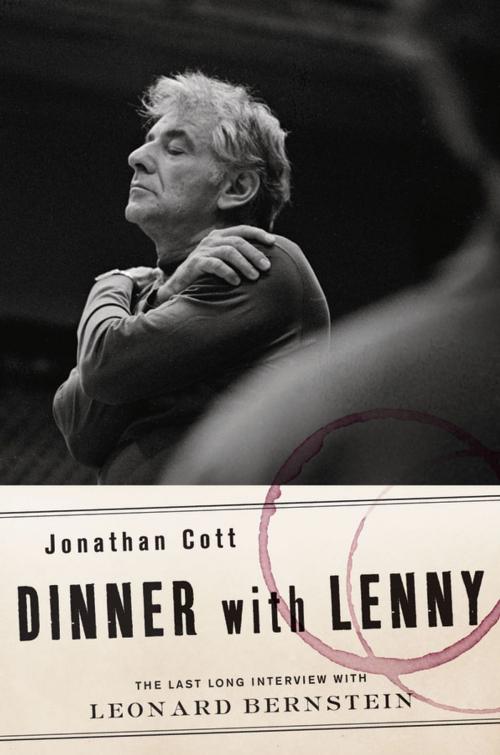Dinner with Lenny: The Last Long Interview with Leonard Bernstein
The Last Long Interview with Leonard Bernstein
Nonfiction, Entertainment, Music, Music Styles, Classical & Opera, Classical, History, Americas, United States, 20th Century| Author: | Jonathan Cott | ISBN: | 9780199311477 |
| Publisher: | Oxford University Press, USA | Publication: | November 30, 2012 |
| Imprint: | Oxford University Press | Language: | English |
| Author: | Jonathan Cott |
| ISBN: | 9780199311477 |
| Publisher: | Oxford University Press, USA |
| Publication: | November 30, 2012 |
| Imprint: | Oxford University Press |
| Language: | English |
Leonard Bernstein was arguably the most highly esteemed, influential, and charismatic American classical music personality of the twentieth century. Conductor, composer, pianist, writer, educator, and human rights activist, Bernstein truly led a life of Byronic intensity--passionate, risk-taking, and convention-breaking. In November 1989, just a year before his death, Bernstein invited writer Jonathan Cott to his country home in Fairfield, Connecticut for what turned out to be his last major interview--an unprecedented and astonishingly frank twelve-hour conversation. Now, in Dinner with Lenny, Cott provides a complete account of this remarkable dialogue in which Bernstein discourses with disarming frankness, humor, and intensity on matters musical, pedagogical, political, psychological, spiritual, and the unabashedly personal. Bernstein comes alive again, with vodka glass in hand, singing, humming, and making pointed comments on a wide array of topics, from popular music ("the Beatles were the best songwriters since Gershwin"), to great composers ("Wagner was always in a psychotic frenzy. He was a madman, a megalomaniac"), and politics (lamenting "the brainlessness, the mindlessness, the carelessness, and the heedlessness of the Reagans of the world"). And of course, Bernstein talks of conducting, advising students "to look at the score and make it come alive as if they were the composer. If you can do that, you're a conductorand if you can't, you're not. If I don't become Brahms or Tchaikovsky or Stravinsky when I'm conducting their works, then it won't be a great performance." After Rolling Stone magazine published an abridged version of the conversation in 1990, the Chicago Tribune praised it as "an extraordinary interview" filled with "passion, wit, and acute analysis." Studs Terkel called the interview "astonishing and revelatory." Now, this full-length version provides the reader with a unique, you-are-there perspective on what it was like to converse with this gregarious, witty, candid, and inspiring American dynamo.
Leonard Bernstein was arguably the most highly esteemed, influential, and charismatic American classical music personality of the twentieth century. Conductor, composer, pianist, writer, educator, and human rights activist, Bernstein truly led a life of Byronic intensity--passionate, risk-taking, and convention-breaking. In November 1989, just a year before his death, Bernstein invited writer Jonathan Cott to his country home in Fairfield, Connecticut for what turned out to be his last major interview--an unprecedented and astonishingly frank twelve-hour conversation. Now, in Dinner with Lenny, Cott provides a complete account of this remarkable dialogue in which Bernstein discourses with disarming frankness, humor, and intensity on matters musical, pedagogical, political, psychological, spiritual, and the unabashedly personal. Bernstein comes alive again, with vodka glass in hand, singing, humming, and making pointed comments on a wide array of topics, from popular music ("the Beatles were the best songwriters since Gershwin"), to great composers ("Wagner was always in a psychotic frenzy. He was a madman, a megalomaniac"), and politics (lamenting "the brainlessness, the mindlessness, the carelessness, and the heedlessness of the Reagans of the world"). And of course, Bernstein talks of conducting, advising students "to look at the score and make it come alive as if they were the composer. If you can do that, you're a conductorand if you can't, you're not. If I don't become Brahms or Tchaikovsky or Stravinsky when I'm conducting their works, then it won't be a great performance." After Rolling Stone magazine published an abridged version of the conversation in 1990, the Chicago Tribune praised it as "an extraordinary interview" filled with "passion, wit, and acute analysis." Studs Terkel called the interview "astonishing and revelatory." Now, this full-length version provides the reader with a unique, you-are-there perspective on what it was like to converse with this gregarious, witty, candid, and inspiring American dynamo.















